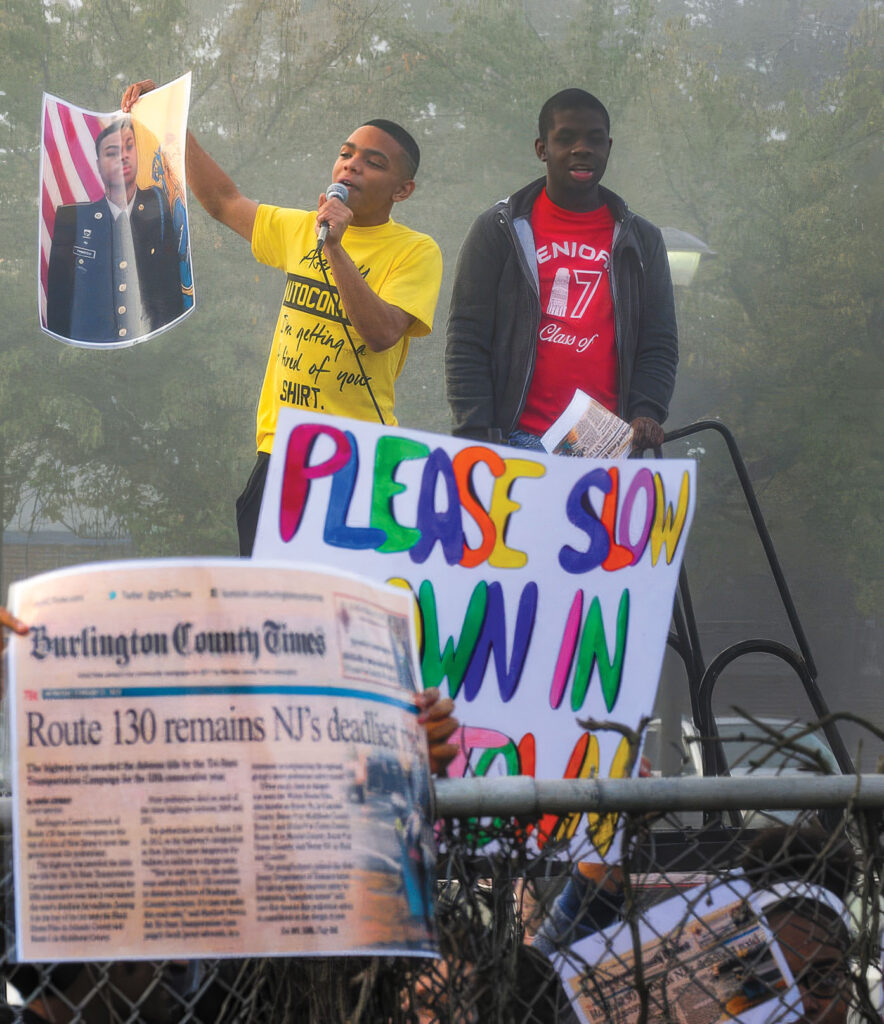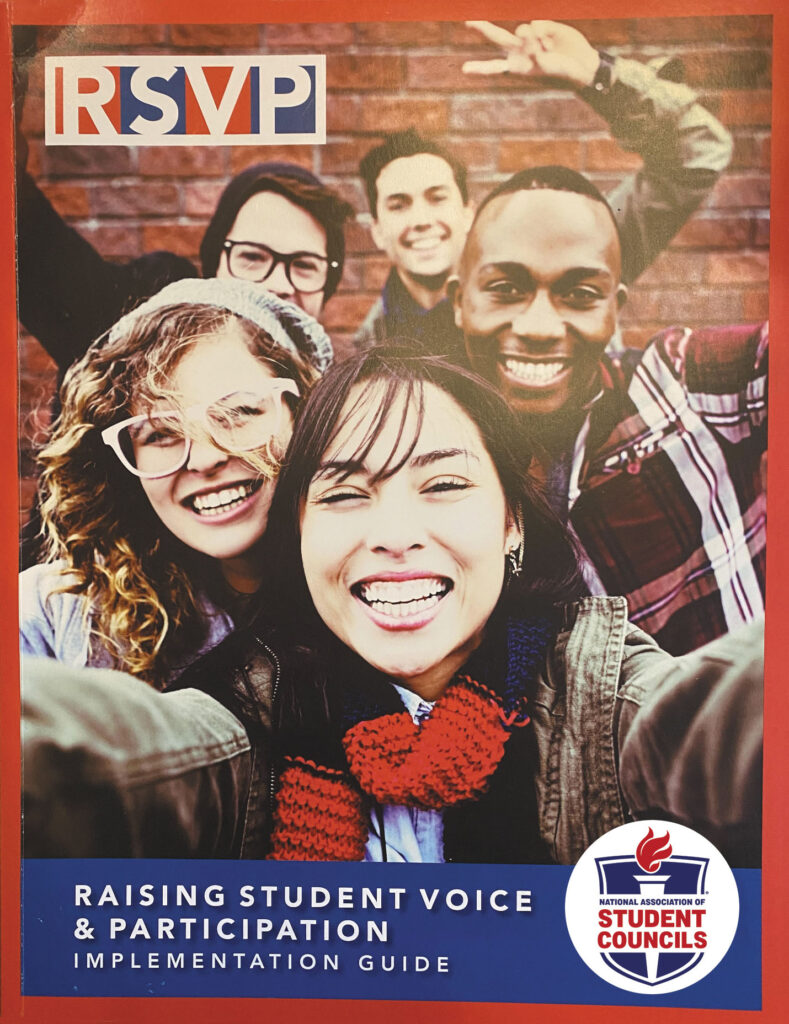Raising Student Voice and Participation

When I was a high school principal, I always tried to listen to students and their ideas for activities, events, and ways to build school pride. However, it was not until a school-related tragedy that I focused on student voice and youth-adult partnerships.
I will never forget May 22, 2016—the day one of our beloved students, Antwan Timbers, Jr., was struck and killed in a pedestrian-motor vehicle crash in our school zone. Our entire school community was devastated. Antwan was a member of the Junior Reserve Officer Training Corps (JROTC) and had recently been named “Most Improved Cadet.” Shortly after Antwan was killed, the JROTC student leaders met with me and were determined to make our school zone safer for all students in Antwan’s honor.
Burlington City High School sits along State Highway Route 130, which is the most dangerous road for pedestrians in New Jersey. There had been one other student killed along Route 130 and two additional near-fatal accidents in the eight years prior to Antwan’s death.

The school year after Antwan’s death, our school started a 25 Saves Lives Campaign in which students and staff worked together in reminding motorists to slow down and to be aware of our students walking in this very dangerous school zone. After two and a half years of advocating for increased safety, the campaign led to New Jersey Governor Phil Murphy signing Antwan’s Law on Jan. 31, 2019, which reduced the speed on Route 130 to 25 miles per hour 24 hours per day in the Burlington City High School school zone.
The Power of Student Leadership
The 25 Saves Lives Campaign opened my eyes to the power and passion of student voice, leadership, agency, youth-adult partnership, and citizenship. Students truly can change the world. To that end, principals and staff need to believe in them and partner with them.
I was a doctoral student during the campaign and my professors advised me to pick a dissertation topic I was passionate about as it was going to consume me for the next few years. I was so moved by the accomplishments of my students and staff during the campaign that I chose student voice. I completed my dissertation, “High School Principals’ Perception and Experience with Student Voice and Youth-Adult Partnerships” in 2022.
During my research, I uncovered an important opportunity for high school (and middle school) principals to embrace student voice and youth-adult partnerships: NASSP’s program, Raising Student Voice & Participation (RSVP). It’s something many high schools and middle schools are well-positioned to implement given that organizations like NASSP’s National Association of Student Councils (NASC) and National Honor Society (NHS) already exist in their schools. Middle schools can also implement RSVP with NASC and National Junior Honor Society. (For more on the program, see this article.)
School Summits and Civic Action Plans
When I discovered RSVP, I was immediately excited to put my research into practice at Burlington City High School. I had outstanding advisers for student council (Sue Andris) and NHS (Alyssa Anderson), both of whom I knew would embrace RSVP. I also had amazing student leaders in both student council and NHS who could help lead the RSVP initiative to incorporate the voices of all students at Burlington City, including those with special needs and those who were marginalized.
We embarked on RSVP in fall 2020. I was searching for a way to connect my students and staff to an educational environment that was anything but normal due to the virtual and hybrid learning of the pandemic. I reached out to NASSP to discuss options for implementing RSVP. Then, our school purchased the Raising Student Voice & Participation Implementation Guide, which describes key roles and provides step-by-step instructions. The guide was an invaluable resource for me, Sue, Alyssa, and the small group of staff members we recruited in partnering with our students to initiate the RSVP program.
“RSVP helps to expand these student leadership programs to encourage the voices of students who are not elected to positions of leadership or heard in school on a consistent basis.“
As a team of students and staff working together, we created an awareness campaign about RSVP and established a leadership team of two students from each grade level. Once the team was in place, we recruited an additional 75 students to be RSVP facilitators for the upcoming student summits. We now had an additional 83 students who were connected to school through RSVP, building their leadership skills, and using their voices to help make Burlington City High School a better place.

We established 10 facilitator teams of students along with one adult partner, and each team conducted group summits via Zoom. Summits included icebreakers, discussion, and questions, such as “What is one thing you would like to see improved or implemented at Burlington City High School?” Facilitator teams compiled the feedback and sent out a Google form to all students to prioritize their areas of improvement. Over 50% of our students responded to the Google form, calling for greater student voice and input. The results of the summits were detailed civic action plans, which resulted in the creation of two new clubs during the 2021–22 school year: the Equity/Social Justice Club and the Gay-Straight Alliance.
Bringing RSVP to Your School
I highly recommend RSVP as a vehicle for you as a principal to foster and support the voices of your amazing students. The structure for amplifying student voice is already in place at most of your schools through student council and Honor Society chapters. RSVP helps to expand these student leadership programs to encourage the voices of students who are not elected
to positions of leadership or heard in school on a consistent basis.
Principals do not have to jump into the student voice arena alone when they are implementing RSVP. NASSP staff can assist in program implementation and the RSVP Implementation Guide answers any questions you may have. I encourage you to recruit a small group of staff members interested in RSVP to adopt this program. Not only will you foster the voices of your students and their agency in creating positive change, you will help develop productive citizens in your school community and society at large.
James Flynn, EdD, is the director of planning/research and evaluation, operations, and state and federal programs at Burlington City Public Schools in Burlington, NJ. He is the former principal of Burlington City High School.
